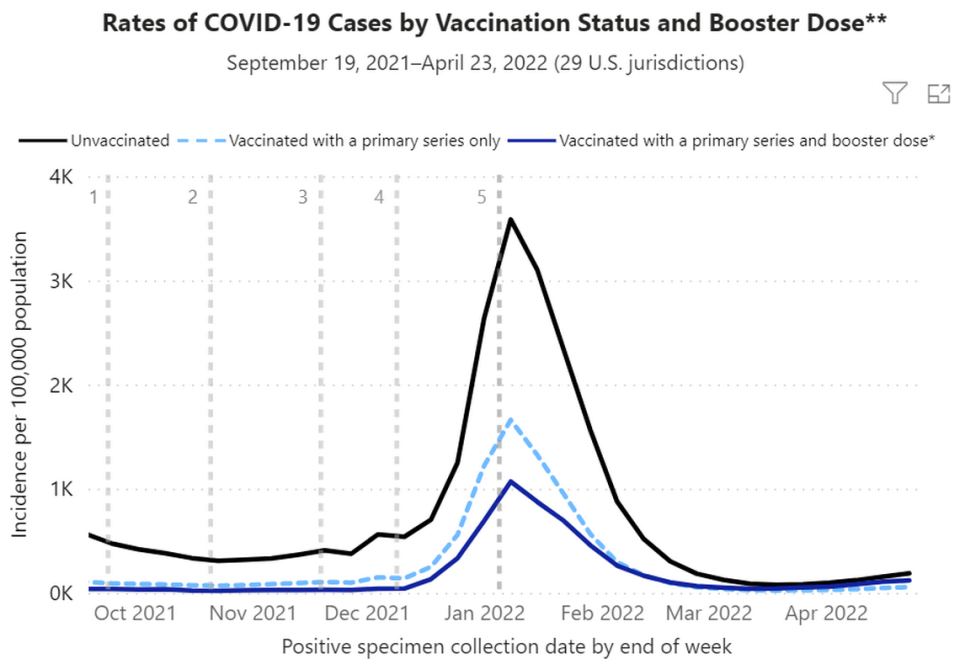How long do COVID booster shots last, and can you get a new one? What local doctor says
COVID-19 hospitalizations are stagnating in Kansas City, indicating that the metro may be reaching a plateau in its latest wave of the virus. Doctors at The University of Kansas Health System noted Friday that new omicron subvariants have largely taken over in the area.
This trend, along with recent CDC data showing that people who received a booster shot have been catching the virus at a higher rate than those who did not, has led to some confusion around the purpose and effectiveness of boosters.
Infectious disease specialist Dr. Dana Hawkinson weighed in on the matter in a Monday news briefing. Here’s what he had to say.
What is the purpose of a COVID-19 booster shot?
The primary purpose of a COVID-19 booster shot is to strengthen the immune system’s preparedness to fight the virus. Boosters are not a guarantee that you will never get sick. Instead, he said, they provide an assurance that if you do get sick, the illness will be milder and much less likely to put you in the hospital than if you did not have their protection.
“Most important [is] the safety and efficacy that those vaccines provide for keeping us out of the hospital and keeping us from severe disease,” said Hawkinson in Monday’s news briefing. “We know that if you’re vaccinated and boosted, your chance of going to the hospital and dying is reduced by 90%.”
Why are people saying that boosted people are catching COVID-19 more than un-boosted people?
Recent CDC data indicates that people who received booster shots may be catching COVID-19 at slightly higher rates than those who are vaccinated but not boosted. On the graph below, you can see that the dark blue line — showing cases among boosted people — has recently risen just slightly above the light blue line — showing cases among vaccinated but un-boosted people.

However, this trend does not mean that booster shots are dangerous or causing more people to become infected. CBS News reported Monday that those with booster shots may be more likely to seek out lab tests that are reported to health officials, while those without a booster may be more likely to take at-home tests that are not officially reported.
In addition to the increased complexity of gathering accurate case data, Hawkinson noted that the severity of existing cases is key to booster shots’ public health impacts.
“Protection against infection, while it did occur early on after vaccination, we know that wanes [over time],” he said. “We have to understand that you can still get infected…. [but] the vaccines are supposed to keep us out of the hospital, keep us from severe disease.”
The graph above does not indicate the severity of these “breakthrough” COVID-19 cases, but the milder cases commonly experienced by those who have received a booster shot are less likely to crowd hospitals with patients and lead to fatalities, he said.
Can I get a second booster shot if I already got one?
If you’re over the age of 50, you are eligible for a second booster shot at least four months after your first booster. Second booster doses are also given to those who have certain medical conditions that make them more vulnerable to illness.
If you’re under the age of 50 and are not immunocompromised, you currently can’t receive a second booster shot. However, Hawkinson adds that your level of antibody protection remains high for more than half a year after your first booster.
“You are still very well protected more than six months out from that last vaccine dose or that first booster. I think people should take comfort in that,” he said. “If you’ve had that primary series and the booster, you are really well protected.”
What’s in store for the future of COVID-19 boosters?
It’s possible that annual COVID-19 booster shots may become a regular part of life as the pandemic drags on into its third year.
“Will we have to get re-boosted on a yearly basis? We are still waiting for the full recommendations from the CDC and the Committee on Immunization Practices,” said Hawkinson. “I think most people are expecting at least a once-a-year boost, but we are also looking at different formulations of the vaccine too, so hopefully that will help as well.”
New formulations of the COVID-19 vaccine could be better suited to tackle newer strains like the omicron variant and its subvariants. Experts also noted that a vaccine for children under age 5 could be ready as soon as June 21.
Do you have more questions about staying safe from COVID-19 in Kansas City? Ask the Service Journalism team at kcq@kcstar.com.

